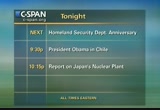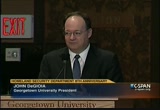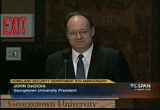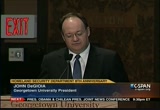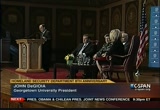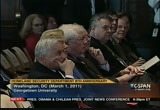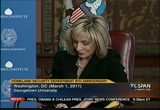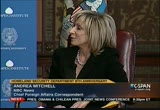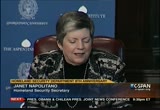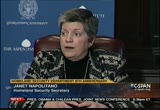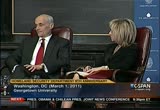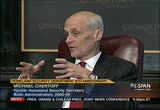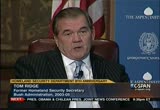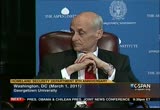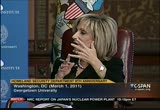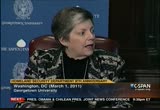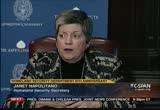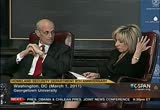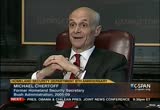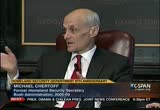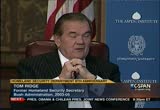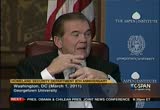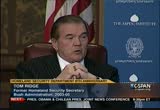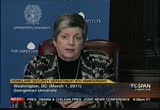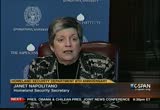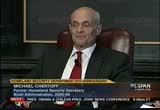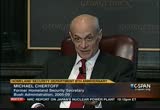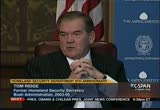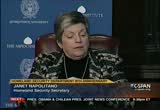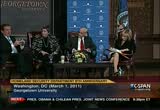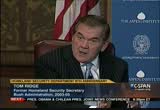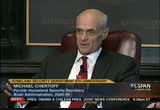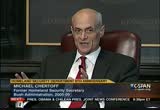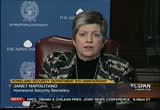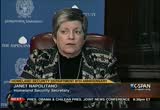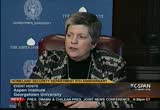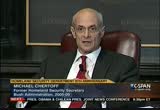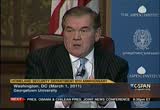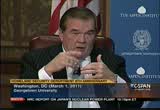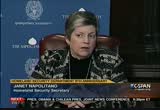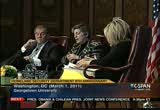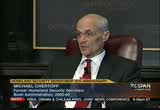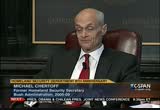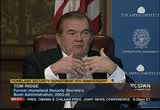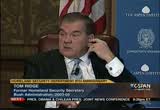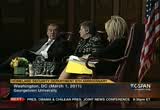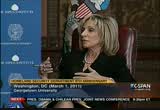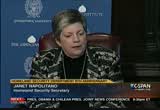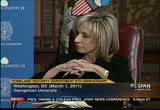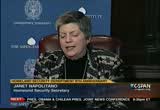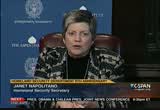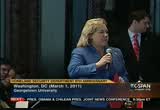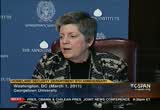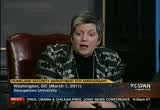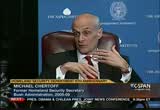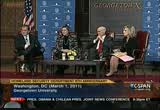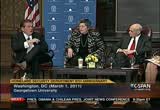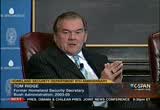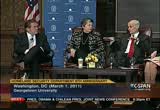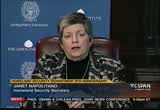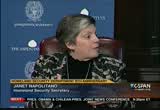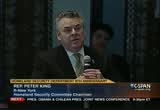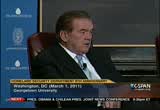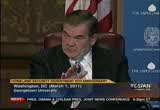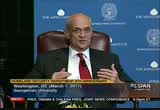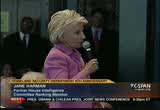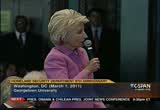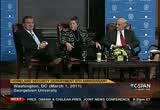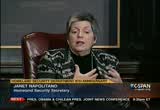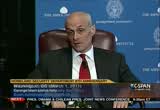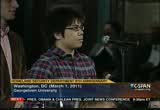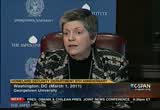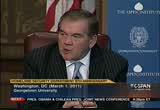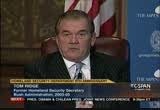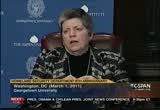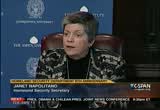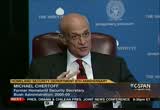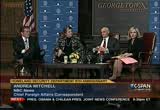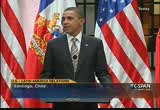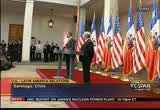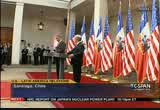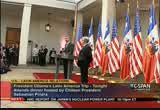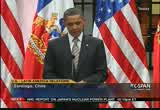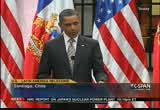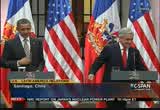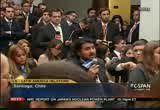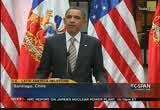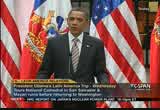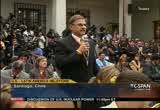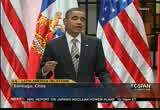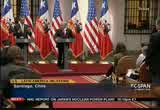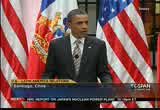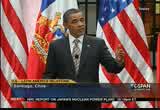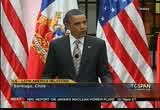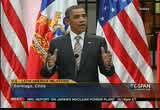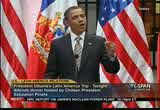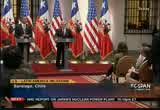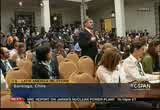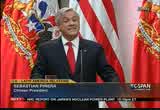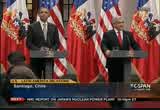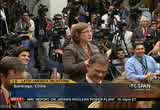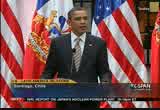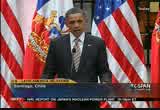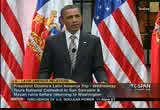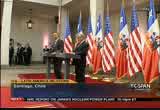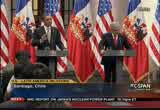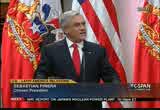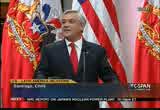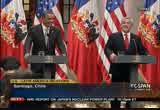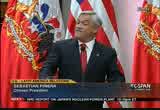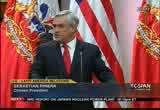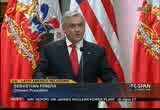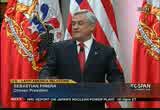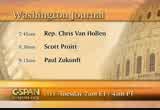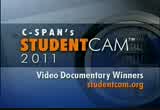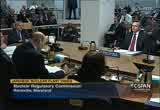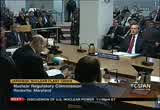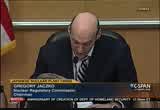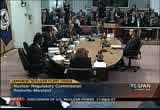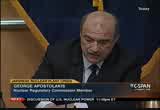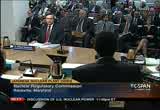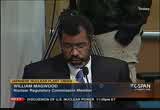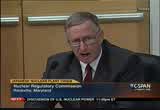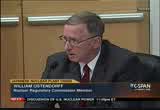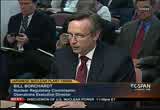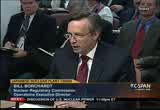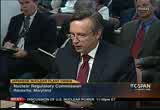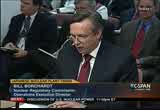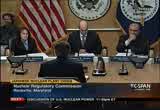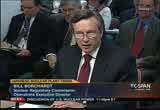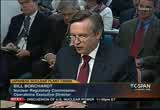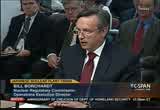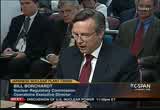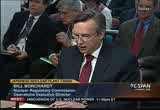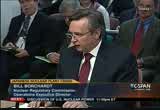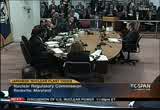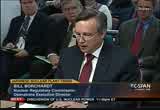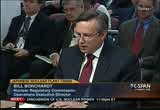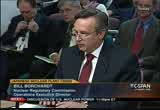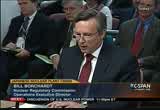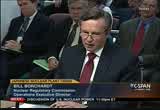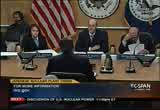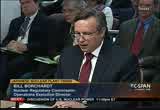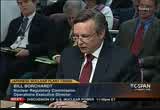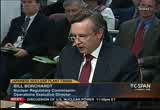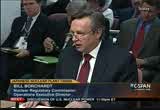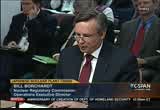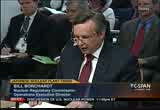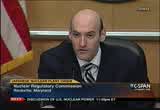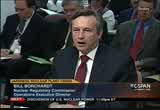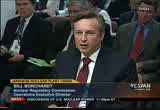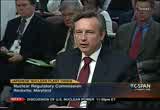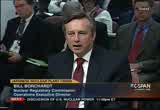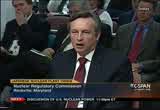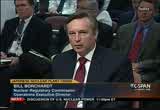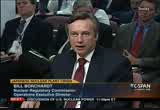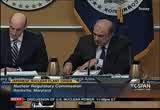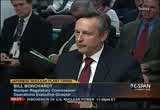tv Tonight From Washington CSPAN March 21, 2011 8:00pm-11:00pm EDT
8:00 pm
president of chile. the nuclear regulatory commission here's our report on the japanese nuclear plant damage by the earthquake in tsunami. tonight on c-span3, a white house summit on bullying, featuring remarks from first lady michelle obama and president obama who discusses his own experiences with bullying as a child. >> as adults, we all remember what it was like to see children picked on. i have to say that with the gears and the name i have, i was not immune and did not emerge unscathed. because it is something that happens a lot and something that has always been around, sometimes we turn a blind eye to the problem. >> watch tonight on c-span3. >> the department of homeland security celebrated its eighth
8:01 pm
anniversary this month. this is an hour and a half. >> good morning. we have a proud tradition of welcoming leaders to this hall, to continue that tradition today with a visit of our first three secretaries of the united states department of homeland security, secretary janet dupont hollow, tom ridge, and michael chertoff. it is an honor for us to have you with us today. we are grateful to be joined today by members of congress. i wish to thank the aspen institute for bringing us
8:02 pm
together today, and in particular to walter isaacson. it is an honor to be able to welcome the members of the aspen institute community here to a georgetown barracks -- to georgetown. i would also like to thank students at the georgetown university lecture fund for helping the staff this event. i wish to welcome andrea mitchell, the lottery -- the moderator of today house conversation. this gives us an opportunity to reflect on the changes of our world since 2001, and the ways in which the united states government has responded. later this year we will observe the 10th anniversary of the terrorist attacks on the world trade center and the pentagon.
8:03 pm
in response to these attacks, congress created the department of homeland security to be led by the secretary, a member of the president's cabinet. the creation of the department united 22 agencies across they say the branch, making it a lot but -- the largest reorganization of the federal government since harry truman. last month, secretary to paul tallow said -- secretary janet the paula, said it takes the reorganization of the entire society, all playing their respective roles. the department of homeland security was created to serve as a catalyst and the greater of the nation's efforts to promote the general welfare. our universities recognize the role we play in this effort, whether in fostering public this court's -- discourse or engaging
8:04 pm
in that kind of scholarship that can support the effort of our nation or by educating the leaders of tomorrow who will contribute to these efforts. it is in that spirit that we come together today. it is my pleasure to introduce our moderator, andrea mitchell, who will begin our program. she is the nbc news chief foreign affairs correspondent. she currently covers foreign policy, intelligence, and national security issues for nbc programs, with a long and distinguished career in washington. it is vioxx op -- it is my honor to welcome andrea mitchell. >> thank you very much. thank you very much. thank you, president. thank you georgetown university, the school of foreign service, and as people
8:05 pm
campus, this historic building. also, the co-sponsor, as then into the homeland security project. i want to acknowledge them and also walter isaacson, and we have key members of congress here today, senator mary landrieu, and also david price, the ranking member, and peter king, chairman of homeland security. john pistol, thank you for coming. let me know if i have missed anyone, but i wanted to get in the to our three secretaries. at not sure if you have been together on a platform before, in testimony or in another venue, but it is great to see here today. i was crippled by the fact that secretary of paula town, who obviously is the -- napolitano,
8:06 pm
the current secretary, has seen the challenges at every level of our national service. she became the third secretary, the leader as the governor on homeland security issues, the first woman to chair the national governor's association. michael chertoff was the second secretary of homeland security, also previously was assistant attorney general for the department of justice, and is a judge on the third circuit court of appeals. and tom ridge, the former governor of pennsylvania, the first secretary, who became the first director of the office after 9/11. he perhaps had the most challenging job of all. elected to congress in 1982 and
8:07 pm
reelected five times, twice governor of pennsylvania, and the first congressman to have been enlisted man in the vietnam war and has been awarded the bronze star, among other accommodations. i was very struck, secretary napolitano, you look at how relaxed they were here, sharing coffee, and he said, there is a feature after being secretary of homeland security. the first question to you is, what keeps you up at night? what is the greatest fear that we face as a nation and you face in your job? is it al araki, is it that 28 people were killed last weekend on the mexican border, part of the ongoing drug war, which some
8:08 pm
say is the most frightening of the challenges facing the homeland right now? what isn't that makes you fearful, and i would like to acknowledge the longtime homeland security specialist, a congresswoman, who is joining us next to walter. >> the greatest threat facing our borders, we should hear from tom and michael, but i think i could say all the above, because all of them touch upon key roles of the part of homeland security. al alaki, one of the key as dollars or in speier first, if i could use that word, in the english speaking world. osama bin loudoun still at large, and al qaeda has been
8:09 pm
constrained to a large degree in terms of its geography, and it's still has served as a core. there are many other al qaeda- related organizations around the world that seek to harm the west and the united states. the border with mexico is something that we focus on quite a bit. it is an area where we are assisting the president of mexico in his powerful war against the cartels that exist over the bridge from el paso, over the roads from laredo, across a huge gully in nogales. that is a key struggle for us, a key issue that we have. i think part of what makes homeland security such a
8:10 pm
complex and challenging position is that it is almost easier to say what you do not worry about than what you need to be worried about at any given time. >> secretary chertoff, how has it changed since your tenure and perhaps a lot of international cooperation and international cargo and the recent threats we have seen? >> i would say what janet has said is approximating the kinds of things we were concerned about what i was secretary. there has been evolution. four or five years ago, outcry, pakistan was the area of greatest threat. now we have al qaeda in the arabian peninsula's, alaki, in yemen, so we are beginning to
8:11 pm
see this issue spread out more. if you look at mexican, that is becoming more and more troubling. partly as a consequence of the president of mexico being heroic in pursuing the drug cartels, but they are pushing back. what we see is a widely distributed threat that might have been the case four or five years ago, and most notable is the home grown terrorism. we have succeeded in the international partners in making it more difficult for people to come into the united states to carry out operations, what we have seen now is greater emphasis on recruiting americans or residentsd to become operative, and that is challenging the model but we use for security. >> secretary ridge, a homeland security department was created eight years ago today. it is really the person
8:12 pm
referred -- a precedent for us getting together. the you think this hybrid creation has been an effective tool could i lot of people have claimed about the intelligence reorganization and that in fact i layering we have created more stovepipes and that the mandate of the 9/11 krishan -- in the case of homeland security, the back, keep you think this has come together into a coherent agency? >> we have to go back and take a snapshot of what government look like right after 9/11, and clearly, the executive branch and congress were struggling with what is the best way to calibrate and reconstitute some very capable people in the organizations, but to create a central agency and the challenge around that was that there were
8:13 pm
a lot of discussions as to what was appropriate to put in the agency. since that time, some of the things that people have challenged with is that teh fema is exactly where it belongs. the configurations of those entities within the department was a corporate, but it was one of the things we discussed before we came out on the stage. everything is evolving from the space. i remember they reorganize the department of defense after world war ii. we were building this new agency at the same time we were trying to build the defensive mechanisms to make america more secure. i started, michael followed, secretary napolitano star to
8:14 pm
do all the budgeting, and they are trying to make a more efficient organization. if they are more efficient internally, you can be more effective at sterling. the challenging that the agency still has, which we have different opinions as to what the risk is the day, although the that has evolved as appeared remember the profile of the terrorist as we knew it right after 9/11, males, arabian peninsula, 18 to 35. that has changed, and we understand that. the biggest challenge the agency still has and i remind everybody every chance we get, the agency is a consumer of information. it does not generate intelligence. all three of us have said everybody has a role to play in homeland security, everyone, all the citizens, but the ec can only act based on the information it is given, and i think eight years later, one of the big challenges is making
8:15 pm
sure that the department of homeland security has enough information so they can share with our partners, private or public. from my perspective, it is still a challenge. >> how much is it luck, and how much is at skill, and governments intelligence gathering who we have not had an attack since 9/11, yet the cause was the bomber in 2009, basically was passengers being alert. the bomber and times square was a street vendor. the cargo been intercepted in terms of taconic printers had to do with saudi intelligence tipping us off. the recent example in texas was
8:16 pm
the best example of homeland working the way it was intended, a shiver notifying -- a shipper notifying the department and i've concluded that the notion that intelligence is simply linear and that you connect the dots is not accurate. what happens now is there is lots of information,a cloud, you have to be able to discern patterns to identify threats, and you have to have multiple layers and multiple layers of our society to recognize the threat and pass it on. you have on the christmas day omeber, a fl -- hallma
8:17 pm
it was the passengers who took him down. we have done things to tighten airline security and we have done that -- a lot in that area. when you talk about shazzad, the great example of citizen involvement. he sells hot dogs whenever, and believe notifies law- enforcement, and we go from tax notice in 53 hours to the apprehension of shazzad. respect to the student in texas, i do not want to comment too much, because it is still a pending matter, an example of how when citizens are involved and when you open the doors and say this is not just a government responsible the, it is a joint responsibility to share information, to recognize threats, then we try to create
8:18 pm
that homeland security architecture that, started, that michael bill on, and that we are offering. >> when you look at the threats, michael chertoff, and we think about airplanes, what about seeming to minimize -- airplane flights with three dozen people with a bomb, went into the buildings, but a bomb [unintelligible] you have to start thinking about priorities, you suggested. that created controversy. have we ignored subways, tunnels, amtrak, because of the focus on airplane security? >> had a general level, this is about risk management. it is not about risk
8:19 pm
elimination. if you want somebody to tell you that the government is going to eliminate all the risk of life, and you are asking someone to be a fantasy. you have to priorities. he will see this with the budget. there will have to be a justice as to where you put the money. you look at potential impact and you recognize that a catastrophic impact kill tens of thousands of people gets more investment and something that would be tragic, but my only killed 10 people. i know it is not fashionable to make that distinction in numbers, but realistically, you have to look at that. the architecture of the response is different. i would say we have done quite a bit over the years in building security in the railway system. we have these joint teams called vipir teams. it has continued under janet,
8:20 pm
and it is not the same fixed architecture ec at the airport because you cannot have magnetometers at every station, but it is risk management using various kinds of tools, people, technology, even k-9's. you have to use different methods for different kinds of threats one thing i want ad. tom talked about later the fed spirit there is no magic solution to homeland security. it is not want to be perfectly address by intelligence, technology. you have to build a system and has multiple layers, so if one fails, another can pick up the job. you have to recognize that human error is a part of the system and that is why multiple layered defense allows you to overcome
8:21 pm
human errors. this is a process and the system and not a single solution. >> when you talk about leaders, secretary ridge, we take off our shoes, then you have we cannot carry our shampoo bottles. it seems we keep building laborers, and when do we reach a point where we aren't not keeping one step ahead of the terrorists could suddenly, should there be an attempt to look at previous threats and perhaps take her out we do not need all the things that are now going into the system? what does it feel to be one of us again? >> i get to see some great people working at tsa.
8:22 pm
with the new machines, i saw one official absolutely getting a very unhappy commercial passenger, and he was very cool and collected, and he took all the grief. i said to him, that was a great lesson in patience and in customer care. do yourself a favor, the next time somebody says that, you should say right to your congressman. i am just doing what i have been advised based on directions from congress. seriously, one of the challenges with commercial aviation is that we talked about this internal as well, we are not quite to the woo risks -- to the risk-managed state yet. every country, do we want to treat everyone as a potential
8:23 pm
terrorist forever and ever put that goes to the -- i agree with my colleague that you never wanted see the point of failure. the first point of failure, is that you did not get the actor. what you do with commercial aviation? i think with the support of congress that will take up more risk-manage of courage. and have asked audiences, and we have tried, people -- volunteer information, we concluded you are not a terrorist. there is no 100% guaranteed income it still has to leave all. this is an irritant, but
8:24 pm
president kennedy in 1962 said -- we go to the moon in 1969. 10 years after 9/11, we have still not figured out the right piece of technology in 2011. we have a lot of work do, but that is one area where we have not learned how to manage the risk. >> this opens up a number of questions about the technology. what would be wrong with advancing on two runs, while metrics and some sort of staggered passenger list, as well as incorporating some of the techniques that the israelis are doing in terms of profiling?
8:25 pm
>> we did not profile. what we do is use a lot of intelligence, about hellinger -- about passengers before they get to the airport. a has been part of a process that began under michael but we have accelerated. there is intelligence about passengers as they come in. within the airport itself, you will see uniformed officers, dogs, persons carrying explosive protection equipment. you come across them. he will not see behavior detection officers to use -- who use techniques in tactics of someone who may be actually anticipating an attack. by the time you get to that charge -- check point, there have already been five layers in
8:26 pm
advance of the. the problem is we do not have a checkpoint of the feature get, an integrated checkpoint that would enable you to leave your shoes on, carry your water bottle, not have to unload your laptop from your briefcase or backpacks. that technology is not there. we fund research at universities to help us identify those technologies that will give us that ability. also, with our national labs. some of the research is at issue as we go to the budget process right now. research and development over all across the federal government is being cut back dramatically in the house budget as it currently stands. that is something that congress will want to take a look at. this kind of research has direct capability. i want to follow on one.
8:27 pm
mike said. one of the reasons we did this in aviation is there is a connect to current intelligence about the desire to attack aviation, either by getting an explosive on a cargo plane or on a passenger plane, and it does not matter which is wished, although i think our adversaries would prefer passenger planes. this is a turn threat. with respect to subways and trains, we have that threat as well, not necessarily as obvious or as frequently articulate it as the threat against aviation, but the president's budget includes money for 12 more vipir teams, because they are useful -- they have multiple different parts to them, but they are able to help us secure some of these surface
8:28 pm
transportation nodes that we hvae. >> what about the tsa? michael chertoff. that is the face of homeland to so many people. we're talking about -- unionization of tsa. some of the cargo checks are subcurrents orchid -- are subcontracted after how would you evaluate tsa? >> i have the opportunity to travel quite a bit by air, and it has worked fine for me. part of it is i plan ahead and i know the rules are so i get myself organized. i watched carefully what other
8:29 pm
people's experience art, and that's the majority of people i see good to the checkpoints cooperate with the officers, and the officers tried to be helpful. it is a challenging job. it is difficult for people to understand is you are talking about millions of people who go through that checkpoints, and it is an area where the government interfaces with the public more than any, except tax time with the irs. everybody would like to have a technological solution. the challenges have been -- if you want to have a machine that looks at liquids, if it takes 30 seconds per bottle, the line would be nine hours long. another panacea i hear talk about is what the israelis did, and we have a system of the haverhill detection that works, but the israelis have one
8:30 pm
airport. we have a different architecture. i am sure that the current administration, just as ours, is intent on developing a technology that will make this easier as low as having the tools, but recognize that it is a triumph that we have not had a hijacking or a bomb go off in an airplane since september 11 in this country, and it is not for want of trying. john pistol could tell you, the amount of things could tell you that are picked up at the checkpoints that could be components of bombs. there was one case a couple of years, where somebody had wires in a big piece of cheese, and it may sound funny, but that is how you test the system. he did not put the bomb on, so that a 9, but you look to see if there are wires or the metal to be smuggled to the system. it is very challenging that they have been successful.
8:31 pm
>> i wanted add one thing. an enterprising journalist will try to tweak the system and have some "nightly news"report . >> no one here. and everybody understands that are not perfect, tsa tests then sells on a regular basis. you build in a redundant la yer of security, and they test it themselves all the time. there is inconvenience associated with it. maybe there is some profile out there i did not understand. i get to see some of the good people doing the best they can, but they do test the system
8:32 pm
themselves, and you need to know that. they're not complacent, sitting back for some it happened. they try to probe and test and the things they discovered they applied later on and you do not know about it. >> how much progress are we making with the european union on a uniform standard so we know that these incoming flights had been vetter to our satisfaction? >> the initials stand for is a process by which we share in advance of people boarding flights, who they are, so this things can be run against a number of different data bases that we have. we will know before somebody gets on a flight or is allowed to get on a flight what we are dealing with. the european union, which
8:33 pm
operates now under something called the littleton treaty, which is new since both of your secretary, is in negotiations with the united states on what ue apipar. we are in the third round of negotiations, and we're getting there to a common understanding of what a good agreement would require. we need to do it in a fashion that real-time information is exchanged, it is and shakers is exchanged in a format where we are talking about billions passengers a day. we need it real time,, format, but we need to manage the data so that concerns about privacy are addressed. >> what does making progress
8:34 pm
mean in terms of real time, at getting an agreement? >> there is an existing agreement. what we do now is negotiating it to make it a. time aime, by the k passenger places an order for a ticket, information is exchanged. >> this has been an evolutionary process to the credit of it is not an r or d. when i was in the white house, and the first couple months, we began discussions with the european unit. we wanted that advance information. it took over a year to get at, but we did not get it until the plane was in the air. at least we got the information. we remembered we turned -- there
8:35 pm
were a couple of people we took off the plane that year. that was the first that. secretary chertoff said that was nice, we deal with relationships, but thanks for giving it to us after the plane is airborne, why don't you do it before the plane is airborne so we do not have to land them and send them back. we-you did that. now the secretary napolitano is taking its of the next step. the color-coded system, the first thing that happened was ashcroft and rich would have a press conference saying the warning is --much maligned, 5-
8:36 pm
color coded system, and public communication was the most important thing the department could did. there was a consensus it had to be reached. it was designed to the people specifically what you should do. all along the way you see eight years ago, every secretary, has tried to improve upon, build, and that is a credit to the men and women who work there because we were there for four years, and everybody understands the evolutionary process. >> one thing that has not changed in eight years is we still have projects across the country, rather than the focus of the money, primarily being in
8:37 pm
the greatest threat areas. what do we do, talking about here marks -- earmarks, there is still a lot this riveted across congressional districts. >> i have to say, overtimed along this became much to improve and there are still urban legends about distribution of money that occurred in the first or second round, that i cannot think reflect reality. as of the time i left, most of the money in the president's budget now, congress sometimes change that, was dedicated to the high-risk areas trad. new york got the most money. generally speaking, we did not a lot of earmarking.
8:38 pm
this has been an evolutionary process to build a system for allocating the money in a way that is more or less reasonable. just to be fair, are times members of congress have a different idea of what the risks are than the president's budget has, and the administration may never be 100% happy with what comes out. it has improved over time. >> getting backing to the issue of al qaeda, is out, the central no longer the central threat, the chief threat that it was, because of what has been able to be accomplished by other technologies? are they now talking about al alaki or other splinter groups,
8:39 pm
especially, as we see all this revolutionary change in the region, are we now facing a greater challenge because we did not have central government intelligence relationships for many years in egypt and others and now have to figure out what this new world is like the look like? >> one of the allegiance we have seen is within our qaeda itself, and whereas 9/11 was a core al qaeda actively, the genesis for the department, that attack, core outcry that has been constrained, by a number of activities that gone, and largely confined to that area between afghanistan and pakistan, although modern
8:40 pm
communications being what they are, things still come out of there that can be used to inspire, to institute, to let people know we are still here and this is -- the west is still the enemy, and that is where you should focus your attention. we now have ap, you have al shabab in somalia, and you have these groups all over the world, and the evolution i have seen really accelerated in 90 years has been the so-called home grown, the united states persons who for whatever reasons, and we did not have a good understanding about what causes somebody to do this, they become themselves conspired to commit jihad, they may travel abroad to get training, and then come back, but that is a key
8:41 pm
concern for us moving forward. that is why it is so important have a security architecture that recognizes that everybody has a role. that is one of the reasons why we are taking national see something campaign, to get across to the citizens at large that everybody has a place in our security. that is why we try to work more closely with the private sector and what they are doing to protect security, because it is knocking just -- it is not just one group using one methodology. it is many different groups, dispersed, and some individuals and small groups within our own country using lots of different methodologies. everything in this area evolves. >> speaking to your point about
8:42 pm
what is going on in the middle east, which is commanding a lot of attention, and in terms of how do you feel about activities there, and we are reminded of a remark about the french revolution. he said it is too soon to tell how it will turn out. things are very much unfolded. on the positive, there is an alternative narrative for progress in the middle east that is in dramatic decision from that run by al qaeda, one of democracy and freedom, and that is a positive model. we do not know how it will play out because as governments are toppled, there will be a need to have a new government to come in that is capable of delivering services to the people. at some point, jobs have to be created. if this new government are not capable of doing that, there
8:43 pm
will opportunities arise for the military to come back or have extremists command. this is an example of an area where the verdict is very much out, and there is a cause for optimism, but also calls for careful watching and waiting, and this will have an intact on our security architecture. >> in fact, secretary to rich, we are seeing libya as an evolution or a devolution that is on to be more like somalia, a failed state. >> have seen in the middle east a -- those days are numbered look alike, and because of the absence of any institutions of civil society, he take a look at egypt and you say, what are they doing for self-government in
8:44 pm
egypt they're doing today that they can build upon? pretty much around the middle east, it will take a while, and one of the great things that i have, taking a look at the region right now is the influence of iran. it is by far the number 1 terrorist provide a tour -- provacateur. you've got to believe they are stirring the pot. he take a look at the support of hezbollah and what has happened in lebanon, the support for syria, the palestinian and israeli jihad. you take a look at egypt, the islamic brother heard, those are all tentacles of iran. there's so much uncertainty, and while we want to look optimistically about what can happen, the obstacles -- the
8:45 pm
outcome would like to be see is the -- crowing in come -- crowing -- growing influence of iran. there is a vacuum, and we need to be concerned about that. while it may not result in direct attacks the united states, unrest in the middle east, israel, what will happen, the world a tough economy, some of these actions are filled by repressive leadership, and that is serious consequences for the united states. they're promoting terrorism in the region, and it spills over to difficult to discern at the present time, but iran is a major problem.
8:46 pm
>> secretary not allow -- napolitano, what is the nexus to end illegal immigration and terrorism? >> right now, the question often raised is, if somebody can sneak across the border, what prevents a terrorist from getting across the border of the and i did states, a unit of mellon nations, as these two huge land borders, and it is physically and physically impossible to have a border patrol agency sitting 100 yards along each of those borders. when you are talking about risk management, as michael said, controlling our borders, and talking about terrorism, one of the things he have that is good
8:47 pm
intelligence. you have to be able to identify before you get to the borders of the united states, who may be transiting, either through mexico or canada or through the air, try to get into our country. then with respect to the borders themselves, we need to understand we are never want to be in a position to seal those borders. too much traffic needs to flow back and forth. they are our number one and two trading partners. we have that order management has good, effected ports of entry, where somebody coming through, if they are trying to use somebody else's identity, that can be picked up, and control as much as possible what is going on between those ports. >> how good is the intelligence? >> the intelligence is not perfect. the idea that there is a
8:48 pm
capability to pinpoint every single threat, even at a granular level, as not realistic. that is the kind of thing you see on television. it is an issue of layerse and having the intelligence, putting the assets on the border that give you a reasonable chance of intercepting and apprehending. the truth is it has worked. over the last several years there have been a drop in the number of people coming into the country. some of that is attributable to the economy, but some of it is also to enforcement. five years ago i was out in the yuma sec her, -- sector, and hundreds of thousands of people would run across the border every day, and the distance between the quarter and yuma a short distance. once they got into the town,
8:49 pm
they would land in. we put up fencing, with some people did not like, we put up technology, we added border patrol, and that number dropped dramatically to literally a handful a day. depending on where you are in the corridor, you can use a series of tools that can minimize the flow. will be an absolute seal? you can manage the risk in conjunction of these other tools . >> does it have to do with economic issues, people coming in, looking for a job who, those people come across the border are not coming across to do harm to the united states. they're doing jobs that other americans did not want to do. that is why in 2007, we will spend a lot of time during a comprehensive immigration reform, which came close to
8:50 pm
passing the senate. it did not make it. in the end it look at putting a lot of border and resources in, but coming up with a temporary worker program in dealing with illegal migrants in the country already. >> i hope some time in the future we end up looking at our immigration policy generally. it is great to talk about defense. at the end of the day the democrats six -- the demographics suggest there will be people all across the border in a lawful way. a comprehensive approach that secretary chertoff attended, there are a couple things i would suggest in this debate. do not think that everybody that comes across the board wants to be an american citizen. we should not be that arrogant. a lot of people want to work
8:51 pm
lawfully and go back home. we need to understand that. we could use biometrics, and at some point in time, building a database where tourists can use. shawn and 4 cents for businesses to go after people who hire people outside. at some point in time, i hope that the congress accepts the responsibility, and i can say this because i was there for 12 years and voted for amnesty under ronald reagan. you got to say to yourself that you will not send 12 million people home. let's figure out a way to legitimize their status, create a new system, and that will be do more for border security than any number of offenses we could put out. [applause] >> long term member of congress
8:52 pm
as well, elected as a republic, how would you persuade people like the governor of arizona and other leading republican voices to take another look at this? >> i have sympathy for governors to try to do with a street that issue fades from the portfolio of concern by governors if the government has a holistic comprehensive solution. >> the budget issue facing now, may be an impetus, because it will constrained even on the ability to put increased investment on enforcement. one thing that people did not realize now is, which those of us who had executive jobs have known, is there are hard choices, and yet to make decisions that are not perfect in order to get things done, in order to alleviate situations.
8:53 pm
maybe that is part of the spirit of dealing with some of the budget challenges we have faced. there will be a recognition that we will have to come up with a solution that takes into account enforcement, but deal with the immigration system over all and can be comprehensive about it. >> i want to bring in a moment, as we bring in the audience, some of our members of congress, because the interaction -- you can say having left office, it is not want to be perfect, but if you are janet nepal,, and you make some sort risk benefit analysis and try to figure out what you can spend or not spent, or an impression that gets killed, and something get across and something happens, there is another attack, she has got to be the one facing a congressional hearing. >> yes.
8:54 pm
>> part of the job description. >> part of the responsibility that each of us has undertaken to lead this department to help build as the parma, to bring it together, and i think each of us acknowledges the risk we take in accepting that position. if you make a decision and it makes -- and it turns out badly, and other words, something you thought would not happen actually does, and it may be nobody made a mistake, and maybe just one of those things that happens, i thinks if you can demonstrate to the public and the public, to the congress, to the public at large, why you did what you did and what the
8:55 pm
reasons for it were, i believe the public itself has matured and is maturing in its recognition of what security is and what risks are. and so i would hope that you could have that kind dialogue. again, when you leave the apartment of homeland security, you are sitting on the edge of your chair quite a bit of that time. >> i wanted to button this down with one other issue out there. it is the role of the media. when you have stories hammering home every day during the christmas travel season about the base of technologies -- in technologies, how do we balance what we do can either
8:56 pm
help or hurt -- it is not our role to be a partner, but there are times when we sit on information at the request of government agencies, most recently happening in pakistan, involving all of us. what is the appropriate health the adversarial relationship that also does not get in the way of national security ? >> this is a daily struggle, because the media is there to cover news, and oftentimes you are in possession of information the media does not have and you cannot share. that means he cannot share it with the public, and that is one of the parts of the job. one of the frustrating things about the media, however,
8:57 pm
present and coming -- present company excluded -- needed to convert something 24/7, and the means the things you need to cover is a conflict. there is a constant drum beat to take a fight or say that person said this, how do you respond to that? that sort of dynamic. as opposed to from our standpoint, a key function of the media is the help get information out to people, particularly when something happens and people have been injured or killed, what happened, why, what is the risk, what do they need to the. or if there's something about tappan, -- to happen, where we have those responsibilities. every morning, as part of my daily brief, i get the upcoming
8:58 pm
weather. i never paid so much attention to the weather, you have to because you have to be alert to areas of the country that may be subject -- right now we finished major winter storms, where looking at flooding in the red river area, forest fires going on in texas, and you have to know all those things to make sure that we are reaching out to governorsreachingmayors, local summers as the centers, and they have all the research is -- resources they need to deal with that. media can be a great partner when you are trying to get information to people. that is not how media sees itself, but in the kinds of things we deal with, that is how we like the media to be. >> with that, i would like to bring the audience in, and first of all acknowledge that help of the homeland security forum, who
8:59 pm
helped bring all this to get it. our thanks to you as well. in the audience we have a well -- a wealth of knowledge share, particularly, from members of congress. we have senator of land through -- senator landrieu hrere, congressman king. >> it would be a great segway to ask -- segue ask the question, and i thank you for being forthcoming. 6.5 years ago, 1800 people were killed in a catastrophic in for sure your feeling when the federal levee system in new orleans collapse. not much has been talked about this morning about an important
9:00 pm
part of the department, which is fema, so i would like ask the secretary now serving, what are your thoughts about how fema has improved, and then i would like that asks secretary chertoff, what you found when you were there, word -- what were you happy about that has improved, and is something that the country needs to focus >> fema now is doing great work, and doing what i have asked them to do, which is to lean forward, to anticipate, to be proactive, if we see something coming. if we have to pay a little more to bring something back, that is easier than having to move material when you are in the middle of a storm or hurricane
9:01 pm
or what their -- or what have you. recently there was a major is storm that came out and only covered 100 million americans, on super bowl weekend. we were afraid that that storm was going to create a lot of ice, and that means you lose a lot of power. and that we would have major power outages in major cities across the united states. we prepositioned a lot of things. fema has expanded their use of social media to get information to people. to keep information flowing to people, because one of the things we have learned in managing crises is that what people search for is information and what they are supposed to do. the more you can get out information and what people are supposed to do, the better off
9:02 pm
we all are. >> that is true. one of the great lessons of hurricane katrina was the importance of planning up front. as a consequence of that, the whole attitude of the department really shifted and a lot of detail planning was launched. that is the touchstone for effective response. in 2008, we saw a lot of that come into play as a benefit. also on the issue of social media, that is a great tool for getting information. i hope we still have the system here, an on-line version of ebay where people who need resources could be matched with people in the private sector who had
9:03 pm
resources in the way we are used to buying -- matching buyers and sellers on ebay. we have had a couple of light hurricane seasons in the last couple of years. i take your point that we should not be complacent about that, because it can very easily be a nasty season next summer, not that i will step and hope it can be avoided, but you are right. >> let me rephrase the question about the current threat environment slightly. in terms of the balance that you in your department must constantly strike between responding to the last crisis, learning from the last crisis and anticipating the next one. i would like to ask the past secretaries how the current threat environment compares to
9:04 pm
what you were able, realistically, to project and anticipate. what has surprised you? what has all the kind of projections that you were able to make? and to ask all of you to reflect on what we might anticipate next, to what extent our current projections you think measure up to what we should look for, in terms of intelligence. >> people have asked me do i miss being secretary. i say yes, i miss working with the people i came to trust and respect and admire because of their hard work. it was very intense, but an exciting time. i miss not knowing. what's your read every morning
9:05 pm
is not something you want to run home and talk your family about, but you do miss not knowing. i cannot answer that question as specifically as the incumbent secretary, but my associates from relationships and conversations i have had -- the threat has evolved into many different directions. the rule now for the department is a little bit more complicated than we thought it would be on september 12, 2001. you have the emergence of another band of terrorists. you have the homegrown terrorists and you now have the lone wolf. the portfolio of threats in my mind is a lot broader than we thought it would be, and unfortunately i don't see any narrowing of those threats as
9:06 pm
the internet continues to be a very effective tool to proselytize, educate, and motivate. whoever succeeds secretary napolitano is not going to see a narrowing of threat. >> i would agree with that. it has gotten more widely distributed and particularly the issue of homegrown terrorism. people that do not -- people do not fit the popular image of a terrorist. did not fit the stereotype. that puts a lot more pressure on state and local governments and ordinary citizens to help provide information. we focused on is a lot in 2007
9:07 pm
and 2008 and is continuing, cybersecurity. we have seen some very dramatic, publicized attacks. that is going to become an increasing area of concern for the department. >> how well equipped are we to deal with the cyber threat? >> we have done a lot in the past two years. we have basically a whole segment devoted to cyber. we have the national cyber incident center crossed the river. we negotiated an agreement with the department of defense as to how we could use the technologies available through the nsa. we have a homeland security person working at the nsa. there are legitimate concerns,
9:08 pm
so we have to do this in the right way. i think cyber will be an ever evolving area. the problem with cyber is, almost by the time we are talking about something, they are on to the next thing. it is really a fast-moving field. quite frankly, none of us on this stage are as good at understanding that as someone who is 20 years old and who has grown up with the computer just as part of life. this is an area where we are really trying to hire people. if there are students in the audience with any cybersecurity interest, i would ask them to see me after this program. [laughter] >> you are going to have a long line. >> i think you have done an outstanding job. the threat is constantly evolving and the department tries to stay ahead of it and
9:09 pm
manage it. i thought what the media did after thanksgiving was absolutely irresponsible. it made it out that the tsa was more dangerous than bin laden. i don't mind people going through metal detectors and being checked out. the day after thanksgiving is the most heavily trafficked day of the year. i think it creates the wrong impression for the public. somehow the tsa is the enemy. we have to realize the enemy is out there and we have to be on guard against it. maybe it is a loaded question, but how can the department do a better job of reminding the american people that the enemy is there, it is not us, and we have to stand together. we should not allow in the criticism to criticize the
9:10 pm
entire effort. >> thank you very much for letting me go first. [laughter] i think that during the past eight years of the department, that has been one of the message is that regardless of who has been secretary, communication is something we have been focused upon. we used to talk about it in terms of this being work. -- being the new norm. in the 1980's, the threat was nuclear. this is a new norm in the 21st century. our job and the job of congress and the job of the media is to report, not to pile on, not to exaggerate, but just to remind everybody -- it feels like there
9:11 pm
is a terrorist attack of some form or another that is reported on a regular basis. after 9/11, people began to understand we are not more vulnerable because of it, we are just more aware. the congress and all those associated with it say the threat is real -- you bet. we have dealt with grave threats in our history before. under the umbrella that we accepted as the norm, we have the strong economy, the strong military. let's remind everybody, the threat is real and we will be dealing with it for several generations. let the professionals worry about it. it is everybody's job to remind the general public, press, secretary, congress, is there,
9:12 pm
we are working on it. let's not beat reckless about it. we are america, we will deal with it. >> it is important that the issue of homeland security as a whole be a non-partisan issue. i think it is important that we avoid what some in the media do, to try to find ways to drive between people. we can disagree about strategies are tactics, but there should not be disagreement about the motivation of the people in the department, whatever their party, which is dedicated to the u.s. and dedicated to defending the country and making good faith judgments. that is an important part of the message we sent to the american public. >> jane harman has always
9:13 pm
represented a bipartisan approach to homeland security. >> obviously the press is perfect after a plot like that. yesterday was my last day in congress as a senior member of peter king's committee. i spent 17 years, starting in the late 1990's, focused on the threats against our country and what to do about them. first of all, the wilson center is non-partisan, and i want to commend of three secretaries for being bipartisan, the way they have treated their department and building each on the record of the last. continuing the policies of your predecessors, that is admirable. that is something in the wilson center is focusing on, trying to be non-partisan.
9:14 pm
here is my question. you were talking about homegrown terror and you gave some examples where alert citizens or law enforcement found these people and turn them in before they could harm us. obviously, communities turn in people, too. the new somali folks who left minneapolis and move to somalia, our knowledge of them come to some extent from their parents and committee members. in northern virginia, five men emigrated or travel to pakistan and returned them by their relatives. law enforcement learn about them from their relatives. that has happened in a number of cases. i question is, how important is
9:15 pm
it to build bridges to the local community. not all the terrorists are muslims, but how important is it to build bridges to the u.s. muslim community in order to learn more about those among them who might seek to harm us, and what are we doing about it? >> i will go first again. i don't know what secretary napolitano is doing, but i suspect it has been followed up. there has been an emphasis within the fbi to reach out and build those relationships. it is about trust and credibility, and being careful the language we use to describe the hottest -- jihadists an
9:16 pm
extremist. i think most of us, all of us think help inappropriate it can be. by and large, the terrorist we are dealing with have come from that community, and that is a fact. it is also important to realize that at one point, -- there are 01 0.4 billion muslims in the world. our responsibility is to reach out and embrace them and bill that level of trust and credibility. it is like the man who went into the embassy to talk about the detroit bomber. that is the kind of information and resources we need.
9:17 pm
>> we have built on that. the fbi has efforts we participate in. we have a civil rights and civil liberties component within the department. that active outreach programs. the muslim community in terms of associations have reached out to us and invited us to other meetings in their communities and so forth. there is an active bridge building going on. it is important, because as tom said, it is important to distinguish muslims from islamists, from terrorist, that very small percentage to seek to do us harm. that small percentage exists, but it is not the muslim community at large. >> i agree with that. it is not just a matter of getting the assistance of the community in identifying people
9:18 pm
who are dangerous, and that has happened, but is also getting the community engaged in learning the narrative of the extremists. it is the sons and daughters in that community who become cannon fodder for the terrorists. it is important to give the community of feeling cut of a stake in the adventure in this country, which is the best antidote to having more recruiting going on. >> it is not just the federal government reaching out. big city police chiefs and the like, they are doing their best to do that. it is very important to bring the responsibility back to the broader muslim community to stand up and be vocal, visible, and consistent in their condemnation of those who basically hijack their religion.
9:19 pm
we would like to see more of that. the relationship has to go both ways. we want to trust and embrace them because they are a source of information, but we need sustained advocacy on their part and condemnation of what they see going on. >> i want to bring in some of the questions. >> i am completing a scholarship and i want to start off by saying thanks for helping me pay my tuition in going to school here. my question is actually about national cybersecurity. it has been a stated goal of this administration and this department to expand and build upon our national cyber security work force. i would like to ask, aside from
9:20 pm
offering the economic consensus, i would like your thoughts on how we can provide the right cultural incentives to get more information security specialists, basically hackers, are those who have the capability to be hackers, into our government. our nation has one of the most talented and skilled communities of hackers in the world, and that is a great resource to tap in going forward with our cybersecurity mission. unfortunately, it seems that many of the members of this community and in some cases some of the best of them remain distrustful and wary of the government because of security concerns and regulation policies. i am curious about your insights on meeting this challenge and how we could bridge this trust gap and get more information security specialists, those who are best at what they do, to work with us in improving our
9:21 pm
national security. >> first of all, we reach out directly. the office of personnel management has actually given the department direct higher authority to hire 1000 cybersecurity specialists. that will be helpful. the problem we have is, exactly as you stated, people who are really good, who you want, they have not thought about working for the government's. we have recruited some nationally unknown hackers to be on our committee. we speak and our present at -- there are actually had conventions, and we are there. [laughter]
9:22 pm
to a larger point, and this goes beyond cyber, talking with young people about careers in public service. it is more than a year or two at a particular non-profit or whatever. is really investing your life and your talents, working for the greater good, working in the government, which is where you can achieve that. then providing the opportunities to demonstrate that. your skills are needed to protect the country. your knowledge and intellect and your energy, what have you. anything we can do to persuade young people that this is a great way to invest your talents is something we are willing to do. in fact, i am giving a series of lectures around the country this year at universities and different subject matter that
9:23 pm
are designed to introduce the department to university students as a place to have a career, and a very rewarding one, actually. >> it would be great if congress would take a look and revisit the roles and restrictions and regulations about engaging the private sector more intimately in developing partnerships with the federal government. i know for my own experience when i tried to track some talented people to help me on tended by three board. the regulations associated with bringing in private citizens to sit side-by-side with government in order to advance a broader interest in security and safety, it is very, very difficult. the regulations are written that
9:24 pm
we are not really going to trust people in the private sector because they might be financially advantage with a contract or just general information. it is about time this country recognize that the wealth of experience and capability in the private sector ought to be brought in to the federal government to deal with a lot of issues, not just cybersecurity. i think the president even alluded to a more efficient and effective government in his state of the union. i hope part of that process is making it easier for people in the private sector to join in partnership. we ought to just trust the americans and make it easier for them to partner with us, particularly in the area of cyber security. >> we only have about five minutes left. some moreto get to
9:25 pm
questions. >> i am currently taking secretary madeleine albright's course on national security. my question is, from the perspective of the departure of homeland security, what are your priority objectives in pakistan and are there any specific policy changes or changes -- policy changes you see toward that end? >> first of all, we have people from the department working in afghanistan. one of the issues there is translating from a military presence to civilian. , spent a year's leave their and what we were doing is helping them build a customs department. if they could collect customs revenue, that is revenue that can be used to fund their
9:26 pm
government. that is very important in and of itself. one of our objectives in afghanistan is to have a transition from military to civilian governments. with respect to afghanistan and pakistan, obviously a key objective is to work with the governments of both countries to identify al qaeda havens and to work to eliminate those. >> the message to all of these students is, you can get into public service and look forward to spending in new year's eve in kabul. it is a great life. [laughter] >> did president bush and for the national will by not seeking a congressional declaration of war against al qaeda, or would
9:27 pm
it have been counterproductive had he done so? what do you feel the effect of his response had today? >> i think he felt that given the joint resolution that it would pass with strong bipartisan support -- it would help him live up to his primary responsibility which is protecting the united states. the congress acted very swiftly in a bipartisan vote in both chambers, and the president took that as appropriate responsibility to proceed to build all those security measures that he felt would protect the united states. >> the changes that have
9:28 pm
occurred in fema are absolutely wonderful. the private sector works -- really enjoys working with mr. fugate. i question is, what is the role of the private sector in the rollout of fusion sinners? >> what they are our state, local, federal entities, not only personnel but databases. the idea is to be able to move begin more quickly share information among different levels of government, but also to receive information back. one thing that happens here in washington -- information needs to be garnered that can be used to analyze trends and tactics.
9:29 pm
there are also hazards, and that is where the fusion centers protect the public health. when we had h1n1, we employ the fusion centers to get out information about vaccines and vaccine availability and the like. different vision centers have different relationships with the private sector. your utility segment, water and so forth. as we look at fusion centers around the country, that is a relationship and the capacity that we are encouraging. that is part of the guidance we are giving and something we look for when we travel. there are now 72 fusion centers. >> in terms of the recent
9:30 pm
attacks to our critical infrastructure abroad and here, what do you see as the role of engaging private-sector with street level, real time information sharing? >> one of the critical issues is how do you make information available in real time? there are structures in place that did that, but one of the challenges is to turn that around quickly and make sure information gets out. a lot of that could be done on- line, but one of the obstacles has been the clearance process. the biggest complaint have heard since i have left, in terms of people in the private sector saying they cannot get access to information are some of the arcane requirements about getting clearance and who has to hold clarence and what you have
9:31 pm
to do to maintain clearance. simplifying the process i think would go some distance to making information available more quickly. >> i think we are just about out of time. that will have to be the last question. i want to thank the aspen institute's and georgetown. the conversation will continue. please make sure you show up for my show this afternoon. [laughter] the aspen security forum is going to have its july program in aspen, july 27-30.
9:32 pm
the aspen institute will continue and even deeper conversation about this. they too are members of congress -- thanks to our members of congress. i neglected to introduce our german ambassador, but thanks to all for participating in a very lively conversation. [applause] >> in a few moments, obama's joint news conference with the president of chile in santiago. about 45 minutes, the nuclear regulatory commission with the report on the japanese nuclear plant damaged by the earthquake in tsunami. after that, a discussion about nuclear power in the u.s., and
9:33 pm
later, a forum marking the eighth anniversary of the creation of the homeland security department. a couple of live events to tell you about tomorrow morning. the group america's promise alliance hosted discussion of how to improve a high school graduation rates. speakers include vice-president joe biden and former florida governor jeb bush. at 8:30 a.m. eastern on c-span3, a conference on how small companies can access capital. panel discussions will be moderated by treasury secretary timothy geithner and head of the small business administration. >> tonight on c-span3, white house summit on bullying and featuring remarks from the first lady and president obama, who discusses his own experiences with bullying as a child. >> we all remember what it was
9:34 pm
like to see kids picked on in the hallways are in the schoolyard. i have to say with big ears and the name i had, i was not immune. i did not emerge unscathed. but because of something that happens a lot, it is something that has always been around, sometimes we have turned a blind eye to the problem. >> this c-span video library is now even more valuable for falling congress. committee hearings are now being gathered an archive in one place. the c-span video library. find out more. we are blog and watch what you want, when you want. obama is in chile today, halfway through his trip to latin america. this news conference is 45 minutes.
9:35 pm
>> first of all i want to extend my greetings to the people of chile. i am so grateful for not only the generous words but also the outstanding hospitality been shown to me as well as my family. i want to begin today by noting that the president and i discussed some urgent events unfolding around the world. together with our partners, the united states is taking military action to enforce the un security council resolution 1973 and protect the libyan people. across the region, we believe that legitimate aspirations of people must be met and that violence against civilians is not the answer. across the pacific, both chile and the united states are supporting the japanese people as they recover from the catastrophic earthquake and tsunami and address the
9:36 pm
situation at their damaged nuclear facility. these events remind us that in our interconnected world, the security and prosperity of nations and peoples are intertwined as never before. no region is more closely linked then the united states and latin america. here in the americas, one of our closest and strong as partners is chile. chile is one of the great success stories of this region. it has built a robust democracy. it has been one of the most open and fastest growing economies in the world. the spirit and resilience of the chilean people, especially after last year's earthquake, have inspired people across the globe. in my speech this afternoon, i look forward to paying tribute to chile progress.
9:37 pm
i was proud to welcome the president to washington last year for our nuclear security summit. mr. president, i want to commend you on your decisive leadership in these first few months of office. a time that has been obviously very difficult and has tested the people of chile. i want to thank you for the focus and energy that you have brought to the partnership between our two countries, which we have strengthened today. we are moving ahead with efforts to expand trade and investment, as the president mentioned, and our existing trade agreement, trade has more than doubled, creating new jobs and opportunities in both our countries. we believe there is always more we can do to expand our economic cooperation. today we recommit ourselves to fully implement our free trade agreement to include protection of intellectual properties or
9:38 pm
businesses can innovate and stay competitive. we agreed to build on the progress we are making towards a trans-pacific partnership, so we can see the full potential of trade in the asia-pacific, especially for small and medium businesses. it is my hope that along with our other partners, we can reach an agreement on the frame work of the end of this year. an agreement that can serve as a model for the 21st century. we are expanding and clean energy partnerships that are key to creating green jobs and addressing climate change, which is evident in the glacier melt in this region. chile is already sharing its expertise with solar in the region. i want to commend the president for agreeing to take another step, hosting a new center to address the glacier melt in the andes. in addition, a new u.s.-chile business council will encourage
9:39 pm
collaboration between our countries and areas like energy efficiency and renewable technologies. our governments have agreed to share our experience in dealing with natural disasters, an area where chile has enormous expertise which is critical to recovery and economic reconstruction. we discussed our shared commitment to expanding education exchanges among our students. we can learn from each other and bring our country even closer together. in my speech i will announce an ambitious new initiative to increase student exchanges between the u.s. and latin america, including chile. even as we deepen cooperation between our two countries, i want to take this opportunity to commend chile for the leadership role is increasingly playing across the americas. chile is a vital contributor to the un mission in haiti, where we agreed that yesterday's election is an opportunity to enhance recovery efforts.
9:40 pm
strong legislation will fight the scourge of human trafficking. mr. president, i want to thank you for offering to share chile security expertise with central american nations as they fight back against criminal gangs and narco traffickers. governments will be working together to promote development in the americas. at the same time, but chile is assuming more of a leadership role beyond the americas. chile took the bold step of giving up its stockpile of highly enriched uranium. chile is the first let american nation to join a new international effort to strengthen civil society groups that are under threat. as a member of the u.n. human rights council, chile has joined with us in standing up against human rights abuses in iran and libya. in short, mr. president, today we have proven again that when
9:41 pm
we work together in the spirit of mutual interests and mutual respect, it is not only good for the peoples of our nations, i believe it is good for the region and for the world. i am confident that our partnership will only grow stronger in the years to come, and i am very much grateful for the wonderful hospitality you are showing me and my delegation. thank you very much. [applause] >> now we will proceed to the questions from the media. we remind you that only three questions will be allowed, and they have been decided on. one from chile, one from international. on behalf of the association of journalists, good afternoon. obama, you have emphasized and
9:42 pm
highlighted the economic management of the leadership in the region. those were your words, and even that successful transition into democracy -- in chile, there are some open wounds of the dictatorship of general pinochet. the son of the murdered foreign minister have said that many of those wounds have to do with the united states. in the new speech that you will announce, the include that the u.s. is willing to collaborate with those judicial investigations, even at the u.s. is willing to ask for
9:43 pm
forgiveness for what it did in those very difficult years? >> any requests that are made by chile to obtain more information about the past is something that we will certainly consider and we would like to cooperate. i think it is very important for all of us to know our history, and obviously the history of relations between the united states and latin america have at times been extremely rocky and have at times been difficult. i think it is important, though, for us, even as we understand our history and a clarity about our history, that we are not tracked by our history.
9:44 pm
the fact of the matter is that over the last two decades, we have seen extraordinary progress here in chile, and that has not been impeded by the united states, but in fact has been fully supported by the united states. how i can not speak to all the policies of the past, but i can speak to the policies of the present and future. our firm commitment to democracy and to eradicating poverty, our full commitment to broadbased and socially inclusive development, our full support of the robust, open markets that have developed here in chile, the work that has been done in order to transform the economic situation here -- those are all things the united states strongly supports.
9:45 pm
again, it is important for us to learn from our history, to understand it, but not be trapped by it, because we have a lot of challenges now, and even more importantly, we have challenges in the future that we have to attend to. >> how do you square your position that colonel gaddafi has lost legitimacy and must go against a limited objective of his campaign, if colonel gaddafi is killing his own people, is it permissible to let him stay in power? and if i may add, the you have any regrets about undertaking this mission while you are on foreign soil, and do you have the support of the arab people
9:46 pm
in this yet? >> first of all, i am going to embarrassed him by letting everyone know that his mother is chilean, so this is a little bit of a homecoming. you don't need to take jim's example by asking three questions, pretending it is one. [laughter] >> one subject. >> first of all, i think is very easy to square our military action and our stated policies. our military action is in support of an international mandate from the security council that specifically
9:47 pm
focuses on the humanitarian threat proposed by colonel gaddafi to his people. not only was he carrying out murders of civilians, but he threatened more. he said very specifically, we will show no mercy to people who live in benghazi. the international community said we have to stop any additional atrocities inside of libya. as part of the international coalition, i authorized the u.s. military to work with our international partners to fulfill that mandate. i also have stated that it is u.s. policy that gaddafi needs to go. we have a wide range of tools in addition to our military
9:48 pm
efforts to support that policy. we were very rapid in initiating unilateral sanctions and then helping to mobilize international sanctions against the gaddafi regime. we froze assets that he might have used to further empower himself and purchase weapons or hire mercenaries that might be directed against the libyan people. there are a whole range of policies that we are putting in place that has created one of the most powerful international consensuses around the isolation of mr gaddafi, and we will continue to pursue those. when it comes to military action, we are doing so in support of un security resolution 1973. it's specifically talks about humanitarian efforts, and we are going to make sure that we stick to that mandate.
9:49 pm
it is also important, since we are on the topic, that i have consistently emphasized that because we are working with international partners, after the initial thrust that has disabled gadhafi's air defenses, limits his ability to threaten large populations like benghazi. there will be a transition taking place and we are one of the partners among many who will insure that the no-fly zone is enforced and that the humanitarian protection that needs to be provided continues to be in place. with respect to initiating this action while i was a broad, keep in mind that we are working
9:50 pm
on a very short timeframe. we had done all the work and it was just a matter of seeing how gaddafi would react to the warning that was issued on friday. despite words to the contrary, he was continuing to act aggressively toward civilians. after consultation with our allies, we decided to move forward, and it was a matter of me directing secretary of defense gates and admiral mullen that the plan that had been developed in great detail extensively prior to my departure was put into place. i have forgotten if there were any other elements of that question, but i tried to be as thorough as possible. the arab league specifically called for a no-fly zone before we went to the united nations,
9:51 pm
and that was an important element in this overall campaign. we are in consultations as we speak. there are different phases to the campaign. the initial campaign, we took a larger role because we have unique capabilities. our ability for example to take out gadhafi's air defenses are more significant than some of our other partners. it shakes the environment in which the no-fly zone could actually be effected. it was important that we got in there quickly so that whatever advances were being made on benghazi could be helpful, to send a clear message that he needed to start pulling his troops back. keep in mind we have only been in this process for two days now. we are continuing to evaluate the situation on the ground. the pentagon and our defense
9:52 pm
department will be briefing you extensively as this proceeds, but the core principle that has to be upheld here is that when the entire international community, almost unanimously, says that there is a potential humanitarian crisis about to take place, that a leader who had lost legitimacy decided to turn his military on his own people, that we cannot simply stand by with empty words. we have to take some sort of action. i think it is also important to note that the way that the u.s. took leadership and managed this process ensures international legitimacy and ensures that members of the international coalition are bearing the burden of following through on the mission as well.
9:53 pm
as you know, in the past there have been times where the united states acted unilaterally or did not have full international support, and as a consequence, it was the u.s. military that ended up bearing the entire burden. i could not be prouder of the manner in which the u.s. military has performed over the last several days. it is a testament to the men and women in uniform who when they are given a mission, they execute and do an outstanding job. but obviously our military is already very stretched and carries large burdens all around the world. whenever possible for us to be able to get international cooperation, not just in terms of words but in terms of planes, pilots, and resources, that is something we should actively seek an embrace, because it relieves the burden on our military and relieves the
9:54 pm
burden on u.s. taxpayers to fulfill an international mission and not just simply a u.s. mission. >> i would like you to answer to the response that the president gave regarding the wounds that still linger in this country and the needs of some of the people in this country for an apology from the united states, and certainly for any assistance in any investigations that are ongoing here. >> 4 years ago, we had a long and profound conversation with president obama. i can tell you that chile, our
9:55 pm
government and this president's firmly believes that the self- determination of peoples and firmly believes in the rule of law and respect for human rights. for that reason, when we had evidence that there could have been a homicide, our governments submitted a complaint and is collaborating to investigate those responsible for the death of the former president. once the judiciary undertake those responsibilities, they will have to assume the penalties and punishment according to a rule of law. indon't have the same basis the other case, but if we had them, we would act the same way.
9:56 pm
i would like to say finally that today, the subject of democracy, of human rights, has no borders, does not recognize any border, and that is progress of this 21st century civilization. that is why chile supports the initiative of the united nations to the security council, nato, and the arab league, to do carnage and killing of civilians in libya. that is the responsibility of the international community, because as i said a while ago, human rights do not and should not respect borders. the responsibility is of all of us in each and every place of the world, whatever the circumstances involved who violate human rights. in my view, the person who has bombarded his own people does
9:57 pm
not deserve to keep on being the ruler of that people. >> [unintelligible] you did not mention the international press. >> are you a lawyer or journalists? [laughter] >> on libya, when you said that you will be transferring command, when are you thinking about transferring command, and would nato be the preferred department to take over that command? you have said that you want an alliance among equals with the peoples of the americas. what deliverables would you go far after this?
9:58 pm
[speaking spanish] >> with respect to libya, obviously the situation is evolving on the ground, and how quickly the transfer takes place will be determined by the recommendations of our commanding officers, that the first phase of the mission has been completed. as i said, our initial focus is taking out libyan air defenses so that a no-fly zone can operate effectively and aircraft and pilots of the coalition are not threatened when they are maintaining the no-fly zone. the second aspect of this is making sure that the humanitarian aspects of the
9:59 pm
mission can be met. but let me emphasize that we anticipate this transition to take place in a matter of days and not a matter of weeks. so i would expect that over the next several days, we will have more information and the pentagon will be fully briefing the american people as well as the press on that issue. nato will be involved in a coordinating function because of the extraordinary capacity of that alliance. but i will leave it to admiral mullen and those who are directly involved in the operation to describe to you how exactly that transfer might take place. with respect to this partnership, i do not want to give you all my best lines from
10:00 pm
my speech. otherwise, no one will come. the thing i'm most excited about is the fact that in a country like chile, it is not as matter of the weekend give to -- we can give to chile, it is about what chile can offer us. we set up a clean energy partnership. we think we're doing terrific work on alternative energy sources. there may be initiatives taking place here that might be transferable to the united states. on education, obviously, we have a long history of public education and universities are second to none. but we want to make sure that in this increasingly integrated
10:01 pm
world, american students are not just looking inward. we're looking at words. the idea of us setting up a broad base exchange program makes an enormous difference. security cooperation, the plight of traffickers in the region is something that we are all too familiar with. we have the example of columbia -- colombia, that has made great strides. what lessons can we take and apply them to smaller countries in central america, for example, better going to do the same structure? to work in concert to help to train effective security
10:02 pm
operations in central america to do would narco traffickers. it is the kind of collaboration that would not be as effective if the united states for operating on its own. i think across the spectrum of issues that we care about, what will characterize this new partnership is the fact that it is a two-way street this is not a situation where a highly developed country is helping a poor and impoverished country. this is a situation where an up- and-coming regional power is now collaborating with us to hope greater peace and prosperity for the region.
10:03 pm
>> the integration of the americas, we are lagging behind. the best way to illustrate this is to compare what has happened in america with what happened in europe. last century, the europeans had two world wars. at some point, and they had the wisdom to abandon the rationale and to embrace the treaty with the leadership of such renown 20 years ago,
10:04 pm
president bush's father raise the idea it never came to materialize. the time is right because latin america has been -- we are of age in now. we need to fulfill our mission. we want to recover the lost time and tap all of its potential. we have lots of things in common with the u.s., and generous territory, hard-working people. we do not have racial problems.
10:05 pm
latin america is called a commitment with its own fate. we are looking forward to president obama as word. we have many coincidences that we studied. we studied at harvard, but the bus. we have many coincidences. we are both sportsmen. president obama continues to be a basketball player. i was in my time as well. i think the first lady of the u.s. is very good-looking, and president obama has said the same about the first lady of chile. there are plenty of coincidences, but the most important one is the one we will find this afternoon. we hope to have a partnership where we have all our existentialist alliance, a
10:06 pm
partnership of collaboration between latin america and the united states, sharing values, principles, and a common vision. that alliance should be comprehensive. it should reach out to the fields of democracy, freedom, rule of law, defense of human rights. we have to improve the democratic charter. it should also open up the doors to the free trade of goods and services, and faster than what we have done hitherto. in addition to that, to include those subject that or the troop pillars of the 21st century, quality of education, science, technology, education. they are the pillars for latin america so as to leave poverty behind. we have so much to learn from a country like the united states.
10:07 pm
in its 230 years of independent life it has given true evidence -- in its 230 years of independence life it has made a large contribution to the progress of mankind. latin america and the united states have a lot to gain from this alliance. we have to reach out to two of the most important challenges of this century, energy and water. if global warming keeps on going, it could be the most scarce resource of our century. also facing the major problems of modern society that cannot be faced unilaterally. organized crime, terrorism, drug trafficking, global warming. the savage of world security
10:08 pm
can no longer be faced individually. we need to work together. [unintelligible] to be appropriate and adapted to the needs and challenges of the 21st century, were the only constant thing we have is change. so the time is right to recover all that lost time, and the time is here so that finally this relationship, let us initiate a new era of collaboration, effectively, concretely, that we truly face and solve the major problems that will also open up the doors to opportunities.
10:09 pm
the society of knowledge and information is knocking on our door. we cannot be late in this tremendous revolution which is so much deeper, that of knowledge and information. it has been very generous with the countries that want to embrace it, but very cool with those countries that do not have it. no child should be left behind, and here we say in latin america, no country should be left behind. thank you. [speaking spanish] >> in a few moments, the nuclear
10:10 pm
regulatory commission here's a report. in an hour-and-a-half, in a discussion of nuclear power in the u.s.. before marking the eighth anniversary of the creation of the homeland security department. later, we will rear air the joint news conference with the president of chile. tomorrow morning, our guest includes chris van holland. oklahoma attorney general will take your calls on a settlement with the banks related to mortgage and foreclosures abuses. he opposes the settlement. we will focus on the terrorist threats on waterways with the coast guard's assistant commandant for marine safety. "washington journal" is like
10:11 pm
every day at 7:00 eastern. >> beginning april 1, throughout the month, we will feature the top winners of c-span's student cam contest. focusing on an event or topic that better helps them understand the role of the federal government. watch the winning video on c- span. >> on television, on radio, and online, c-span, bringing public affairs to you. created by cable, it is washington, your way. >> the nuclear regulatory commission heard a report today that the japanese nuclear plant damaged by the earthquake and tsunami is close to being stabilized and no adverse health effects expected from any radiation leaks.
10:12 pm
this is an hour and a half. >> good morning, everyone. people across the country and around the world who have been talked -- touched by the magnitude until this disaster are closely following the events in japan and the repercussions in this country and in many other countries. before we begin, i would like to offer my sincere condolences to all of those who have been affected by the earthquake and the tsunami in japan. our hearts go out to all lead in dealing with the aftermath of these natural disasters. we are mindful of a long and
10:13 pm
difficult road they will face in recovering. we know the people of japan are resilience and strong and we have every confidence that they will come through this difficult time and move forward with resolved to rebuild their vibrant country. i believe i speak for all americans when i say that we stand together with the people of japan at this most difficult and challenging time. the nrc is a relatively small agency. we play a critical role in protecting american people and the environment when it comes to the use of nuclear materials. we have our inspectors to work full time as every nuclear plant in the country and we are proud to have world top scientists, engineers, and professionals representing every discipline. since friday, march 11, when the earthquake in tsunami struck, the headquarters operations center has been operating on a 24-hour basis to monitor and analyze events at nuclear power
10:14 pm
plants in japan. at the request of the japanese government, and through the united states agency for international development, the nrc sent a team of technical experts to provide the on the ground support and the of been in continual contact with them since they deployed. within the united states, but the nrc has been working closely with other federal agencies as part of the u.s. government's response to the situation. in the united states, we have an obligation to the american people to undertake a systematic and methodical review of the safety of around domestic nuclear facilities. beginning to examine all of the available information is an essential part of our ability to analyze the event. our focus will always be on keeping plants and radioactive materials safe and secure.
10:15 pm
as the immediate crisis in japan comes to an end, we will look at any information we can to gain experience from the event, and to see if there are changes we need to make to further protect public health and safety. together, will review the current status and identify the steps we will take to conduct the review. in the meantime, we will continue to oversee and monitor plans to ensure that reactors remain safe. on behalf of the commission, i want to thank all of our staff for maintaining their focus on are essential safety and security mission do well these difficult days. i want to acknowledge their tireless efforts and their critical contribution. in spite of the evolving situation, the long hours and the intensity of effort of the past week, the staff has approached their responsibilities the dedication, determination, and professionalism. we are all incredibly proud of their efforts. the american people can also be
10:16 pm
proud of the commitment and dedication of the federal work force, which is exemplified by our staff every day. i want to reiterate on behalf of the commission and all of us here in this room, our sympathy with the crisis and the difficult situation to where friends and colleagues in japan. we look forward to continuing our efforts to provide them with assistance as they continue to deal with a very challenging situation not only with the nuclear facilities, but with many of the other impacts on this natural disaster. i would like to offer an opportunity to make some comments. >> thank you, mr. chairman. i want to add my voice with others regarding great sympathy over that -- that we feel. the dramatic images of the events at the issue among -- have an added dimension for us as a community of nuclear safety
10:17 pm
professionals. for us, these images are not an abstraction great many of us have traveled to deadpanned. give toward the facilities of our japanese colleagues. we'll work alongside them. the sense of anguish we field as we desire so desperately to do something to help our friends and colleagues has been so clearly evident on the faces of the men and women working here. we are heartsick over this tragedy. summit characterized that our faith in this technology is shaking. but nuclear safety has not been and cannot be a matter of faith. it has to be a matter of fact. today, we continue the systematic evaluation of fact.
10:18 pm
in taking the systematic and deliberate approach, this review, i am certain the commission will achieve this objective. thank you. >> i joined the chairman and commissioner of expressing my condolences to the people of japan and also second the chairman's comments on commending the staff for its response to this accident. >> thank you, chairman. this is a very personal tragedy. i have heard from friends in tokyo worried about radiation. a lot of uncertainty about what will happen next.
10:19 pm
i have one friend who lost all for utilities for several days and is still waiting for water to be restored. in the aftermath, she is making new friends as people bond together to help each other and to comfort each other and make the best of the difficult situation. fortunately, she found a neighbor that has a well. she has been able to get water. i am sure there are thousands of examples of people who are reaching out to each other, bonding and the community. the scale of the tragedy is staggering, but japan will recover. japan will not stand alone. it has not stood alone. we in the u.s. are close friends with japanese people and i'm very proud of how our country has responded to this crisis and proud of how the nuclear regulatory commission staff has responded. the staff has demonstrated
10:20 pm
expertise and selflessness of the last 10 days. i applaud their outstanding efforts. the commission will receive an update on the nuclear situation in japan. there will be important lessons learned from the fukushima plant. this meeting of the first of many as we engage to understand the issues and address those issues to ensure the safety of u.s. nuclear power plants. i look forward to working with my partners on the commission to do so. >> thank you. >> thank you, mr. chairman. this is an important meeting. i want to join my colleagues and sending my personal sympathies to the people of japan. the consequences and loss of life are devastating. our thoughts and prayers are with all.
10:21 pm
i would like to commend the chairman, the executive director of operations, and our staff for their efforts in supporting the inner sea monitoring assistance associated with these events. -- in our sea of mud train assistant associate with these events. -- nrc. i've been very impressed with the technical competence and professionalism demonstrated by the staff. i am also grateful for the team dispatched to japan. will dismayed by this tragedy, i am also extraordinarily proud of the commitment and rationalism of our team. the events have unfolded over the last 11 days a startling. on one hand, i believe that our existing licensing and never said activities assure us that our commercial power plants are safe. on the other hand, i know that
10:22 pm
we must conduct an examination of nrc's regulatory framework. as we head down this path together, i know this commission will stay mindful of the challenges that face us. in the last week, i fully support his call for a systematic and methodical review. we must also do this in a way that clearly communicates to the american people what this review means and what it implies for the sake of our existing nuclear power plants. thank you. >> with that, we will turn it to the executive director of operations. >> thank you. good morning. i would like to join in your
10:23 pm
expressions of condolences to the people of japan. years of very close and personal interaction with a regulatory counterparts and we would like to extend our condolences to them. we are mindful of our primary responsibility to ensure the public health and safety of the american people. we have been very closely monitoring the activities in japan. we have been reviewing all available information to allow us to conclude that the u.s. plants continue to mock -- operate safely. there has been no reduction in the licensing or oversight function of the nrc as it relates to the u.s. licensees. contributors to the conclusion that the current fleet of reactors and materials continue to protect the public health and
10:24 pm
safety are based on a number of principles, including the fact that every reactor in this country is designed for natural events based upon the specific site that riyadh -- the reactor is located. there are multiple vision product barriers and a wide range of diverse and redundant safety features in order to provide public health and safety assurance. we have a lot regulatory history of conservative decision making. we have been intelligently using risc insights to help inform our regulatory process. we have never stopped to make improvements to the plant design as we learned from operating experience over the more than 35 years of civilian nuclear power in this country. some have been derived from lessons learned from previous
10:25 pm
significant events, such as three mile island. we have severe accident management guidelines, provisions to the emergency operating procedures, procedures and process is for dealing with large fires and explosions at regardless of the cause. we have a station blackout rule. we have a hydrogen rule for reactors and many others, which i will go into later. all of these relate in one way or another to the tragic events in japan. in addition to all that we have done, over the many years, the industry is also performing many verification activities at this time to verify that all of these prophecies and procedures and rules that have been implemented are still available -- still valid. from a very high level, the
10:26 pm
response center from the operations center here in rockville, as well as the team that is in japan. it focuses on three major areas. the first is the support to -- support the japanese government and our regulatory counterpart. to gather information and a sense that information for implications on the u.s. facilities. the third is to support the u.s. ambassador in japan with the level of nuclear expertise. we are mobilized to support the u.s. government in responding to this event. notwithstanding, we continued to maintain our focus on our domestic responsibilities. we do not expect the releases of
10:27 pm
radioactive material to have any affect on the health and safety of the u.s. population. the next slide shows the agenda for this meeting. given the time constraints, it will be relatively high overview of activities. the room has been held a number of staff better available to explore any questions and answers that he might have later. -- that you might have later. i would move to a brief overview of the events. on friday, march 11, an earthquake hit japan, resulting in the shutdown of more than 10 reactors. to our understanding, the reactors' response to the earthquake went according to design. there is no known problems to our knowledge with the response of that event.
10:28 pm
the ensuing tsunami, however, caused a loss of emergency ac power to six units of the fukushima site. it is those six units that have received the majority of attention since that time. units one, too, and three were in operation at the time. units 4, 5, 6 were in a previously scheduled outages. immediately, after the tsunami, it appeared that there was no injection capability into the reactor vessels on units 1, 2, 3. on saturday, march 12, the hydrogen explosion occurred in a one, and the following monday, march 40, hydrogen explosion in unit 3 -- march 14. on the 15th of march, there were explosions in unit two and unit
10:29 pm
4. at this time, it is our assessment that is likely that unit's one, too, and three have experienced some kind of cord damage. today, -- core damage. today, all three units appear to be stable. containment integrity, for all three units is also believed to have been maintained. some great smoke is limited from unit 3. the source of that smoke is a non. -- on known -- unkonwn. on a sign of some promising has been yet -- has
10:30 pm
been able to bring some power on to the site. it is of the border of units 1 and 2. there is early indication that there may be cabling problems within the units, so i understand that they are now in the process of laying some temporary cables to some of the pumps and valves inside of units 1 and 2. over the next day or two, they will be doing the same thing for units three and four. there are two diesel generators that are currently running and supplying power to units 5 and 6. moving to the nrc response, shortly after 4:00 in the morning on friday, march 11, the operation center made the first call informing management of the earthquake and the potential impact.
10:31 pm
we went to the monitoring the mood at the operations center and the first concern for the nrc was a possible impact of the tsunami on u.s. plans on the west coast. on that same day, friday, march 11, we dispatched to experts to japan to help at the embassy and again interactions with our japanese regulatory counterparts. by monday, we had dispatched a total of 11 staff to japan. the areas of focus is the support the japanese government and respond to requests from our regulatory counterparts. to support the u.s. ambassador and his understanding of the regulation -- of the nuclear impact of this event. third, to help the information flow from japan to the u.s. nrc to assess the implications on
10:32 pm
the u.s. fleet in as timely a manner as possible. we have had an extensive range of stakeholders that we have had constant interaction with ranging from the white house congressional staff, our state regulatory counterparts, it wide range of other federal agencies, and the international regulatory bodies around the world. our ongoing response is that the nrc operations center remains in the 24/7 posture. this has involved the efforts of robert 20050 -- over 250 staff.
10:33 pm
to help maintain an information float on the current operating reactors in this country. the agency is coordinating the response to this event. we can provide the assistance in japan and not miss any of our normal activities regarding domestic responsibilities. in addition, we remain aware of u.s. industry efforts to provide assistance with their counterparts. the u.s. government has an extensive network of radiation monitors across the country. epa systems has not identified any radiation levels of concern in this country. natural background from things like rocks, building, that is 100,000 times more than any
10:34 pm
level that has been detected to date. we feel confident in our conclusion that there is no reason for concern in the united states regarding radioactive releases from japan. i would like to focus for a few more minutes on the factors that go into assuring us that domestic reactors' safety. we have since the beginning of the regulatory program and the united states, used the philosophy of defense. it recognized that the nuclear industry requires the highest standard of design, construction, oversight, and operation. even with that, we will not rely on any one level of protection for the entire purposes of protecting public health and safety. the designs for every single reactor in this country take
10:35 pm
into account the specific site and does a detailed evaluation for any natural event, such as earthquakes, tornadoes, hurricanes, floods, tsunami, and many others. in addition, there are multiple physical barriers. in addition to that, there are about to burst and redundant safety systems that are required to be maintained operable and frequently tested by nrc regulation. we have taken advantage of the lessons learned from previous operating experience. when of the most significant in this country, of course, being three mile island. as a result of those lessons learned, we significantly
10:36 pm
revised the emergency planning, the emergency operating procedures. many human issues as it relates to allow control room operators operate the plants. we added the requirements for hydrogen control to help prevent explosions. we also created requirements for enhanced indication of pumps and valves. we have opposed accident sampling system that requires -- that allows for the monitoring of radioactive material released and possible fuel degradation. of course, one of the most significant changes after three mile island, we created the resident inspector program, which has the least two full- time inspectors on site but have unfettered access to all licensee activities, 24 debt -- 24 hours a day, seven days a week. as a result of operating
10:37 pm
experience and ongoing research programs, we have developed requirements for severe accident management guidelines. these are programs that perform a what it scenario. what of all this careful design work, these important procedures and practices and instrumentation, which if that fails? what procedures and policies and equipment should be in place to deal with the extremely unlikely scenario of a severe accident? those have been in effect for many years and are frequently evaluated by the nrc inspection program. as a result of the events of september 11, 2001, we did a similar evaluation and identified important pieces of equipment that regardless of the
10:38 pm
cause of a significant fire or explosion, we would have a pre staged equipment procedures and policies to help deal with that situation. all of these things are directly applicable to the kinds of significant events. there has been a number of new rulemaking that directly relates to japan. there is a station black doctoral. it requires -- there is a station of black coat colt -- lblack-outtrule. there is a hydrogen rule which requires modifications to reduce the impact of hydrogen
10:39 pm
generated. there is equipment qualification rules that requires equipment indication equipment, to remain operable under the kinds of environmental temperature radiation conditions that he would see under a design basis axiom. going directly to the type of containment design the plant in japan have, we have had a containment improvement program since the very late 1980's. it installed a hardened the vent systems for the containment cooling. enhanced reliability of the automatic depressurization system. i also mentioned earlier that we have emergency preparedness and
10:40 pm
planning requirements that provide ongoing training and testing and evaluation of emergency preparedness programs and coordination of other federal partner fema. that entails extensive interaction with state and local governments as those programs are evaluated and tested on a yearly basis. over the near-term, the nrc activities -- concurrent with the event evaluation that we're doing for the operations center and the team that is in japan, we will be enhancing inspection activities for temporary constructions -- instructions to our inspection staff. look at the readiness to deal with both the design base is accidents and beyond design
10:41 pm
basis accidents. we already issued an information notice to the licensees to make them aware of the events and what kinds of activities we believe they should be engaged in to verify their readiness. every single day, we assess whether there is some additional regulatory action that needs to be taken immediately in order to redress the information that we have. the temporary inspection is verifying that the capabilities to medicate conditions the results from severe accidents, including the loss a significant operational safety systems, are operational. they're a fine the capabilities to mitigate a total loss -- of verifying the capabilities to mitigate a total loss of power. verifying the to the abilities to mitigate problems associated with flooding and the impact of
10:42 pm
floods on systems both inside and outside of the plant. they are identifying equipment that is needed to the potential loss of equipment due to seismic events, appropriate for the site. each site has its own seismic profile. the information that we gathered from this temporary inspection will be used to evaluate the industry's readiness for similar events and aid in our understanding of whether additional regulatory actions need to be taken in the immediate term. for a near-term effort, we are beginning very soon a 90-day effort that will evaluate all the currently available information from the japanese event. look at it to evaluate our 104 operating reactors ability to protect against natural disasters.
10:43 pm
to evaluate the response to station blackouts. look at radiological consequent analysis and also look at severe accident management issues regarding the equipment. i expect that coming out of this, we will have the development of some recommendations for generic communication, it did to make sure that the industry has a broad understanding of the events and the issues as best we understand them, but also that we would evaluate whether or not some regulatory action would be required in order to require the licensees to take some action the they have already done. i suspect that this 90-day effort will include a quick look and 83-day report to the commission. we stand ready to brief the
10:44 pm
commission as you desire. i think we will have a limited stakeholder in all but in this activity. it will be independent of industry efforts that might be ongoing. the idea is to just get a quick snapshot of the regulatory response and the condition of the u.s. fleet. based on whatever information we have available. i recognize that we have limited information now, more and more information will become available to us as the golan. we wanted to do at least this quick look beginning very soon. consistent with the commission's practices, the result of this report will be made public. we will be developing lessons learned that are somewhat dependent upon when we began to get a better understanding of
10:45 pm
the events on the result of the earthquake and tsunami in japan. it is difficult to precisely state when the start date for this longer-term review will be again. the review may include the involvement of other federal agencies, but it will certainly include interaction with those other federal agencies because there is the issue of emergency preparedness. that is a prime example where we would interact with fema. we would identify the lessons learned to incorporates any long-term agency action. we will evaluate all the technical and policy issues to identify additional research or generic communications, changes to our reactor oversight
10:46 pm
program, potential new rule making, adjustments for the regulatory framework that should be conducted by the nrc. we will evaluates agency issues and also look for applicability to non -- i expect a slugger to report to have substantial stakeholder involvement -- i expect this longer report to have substantial stickle dirt involvement. -- stakeholder involvement. in conclusion, i want to make it clear that we continue to make our domestic responsibilities of licensing and oversight of the u.s. licensees our top priority. there are a valuations that are beginning and they will be
10:47 pm
influenced by our understanding of the events in japan. with that, that concludes my presentation. i am ready to enter any questions. >> thank you, bill, for the thorough presentation. we have a proposal in front of the commission now to consider the options for the short-term and long-term review. we will take a look at that and provide responses. i want to reiterate my thanks to the work that you and your team have done over the last several days to deal with this situation and to emphasize the importance of a methodical review so that we do make sure that we approach these issues and really get the facts and make sure we do not move in a direction that is based on early information, which often tends to be confusing.
10:48 pm
i appreciate the work that you have done to this point. i did not have any specific questions at this time. >> thank you, mr. chairman. tuba, bill. i second the chairman's comments about the tremendous -- thank you, the bill. i said the chairman's comments. there is a lot that we do not yet know and so that becomes a context for the types of questions that we're able to ask about this event. very generally, i would ask you , in the staffs expert assessment this morning, do you believe that the events at fukushima have stabilized or is it reasonable to expect that events there will continue to be dynamic in the days and weeks to come? >> the fact that of site power is close to being available for
10:49 pm
use is perhaps the first optimistic sign that we have had that things would be turning around. we believe that the vehicles on the units 3 and 4, to companies that were of a significant safety concerns, the situation there is stabilized. the containment and all three units, one, too, and 3, appeared to be functional. there is water being injected into the reactors. optimistically, things appear to be on the verge of stabilizing. this has been a very challenging a bent -- a very challenging event for us to understand the exact situation. the information is sometimes conflicting. it is certainly not the level
10:50 pm
that any engineer would like to have an order to do a thorough analysis. we've spent a lot of the time trying to piece together our best understanding. that would be my personal assessment. >> is it fair to say from that that based on what we understand now of the needs that need to be addressed at the site, those are being addressed and they have the status that you just described to me? those are the items of highest interest. it sounds also like in the days and weeks to come, we will certainly discover other conditions and things at the site that we do not know about right now? >> yes. the radiation releases that we have seen on sites were primarily influenced by the condition of the units 3 and 4.
10:51 pm
the water inventory questions, whether or not there was some tool uncovered, it was of significant concern. pepco, the licensee, and the government of japan have been making a concerted effort to address those issues. i did not believe we have anywhere near a clear understanding of what the plant conditions are like within the reactor buildings. what kind of electrical cabling has been damaged, what kind of pumps and valves remain operable, it is significant unknown right now. >> thank you. he gave a very high level chronology of the events that occurred. a rally in the being a narrative of three events that are -- it really in some of being a narrative of the three events related to each other. first, the earthquake. second, this tsunami.
10:52 pm
followed by the loss of power. in terms of what we know now and given that there are these three events in succession, do you think that are regulatory focus right now for the review we are doing is where it needs to be? >> i am quite confident. we looked at all the information that we're getting from japan. we'll look at the debate -- at the design basis for the u.s. reactors. we continue with the inspection program. we have a high degree of confidence. >> thank you. there has been some discussion of what we called generic safety issue 199 -- that is a program that we have at the nrc. could you talk a little bit about the ongoing nature?
10:53 pm
could you talk about what was occurring there and how the events in japan may alter how we approach that generic safety issue going forward? >> occasionally, it is every five years or so, the usgs does the review of information than unpacks the government's understanding of seismic frequencies and issues associated. recently, they put out a reports that talked about the seismic information for the central and eastern united states. that information has been given to the industry. there is now both industry and -- it would cause us to have to
10:54 pm
change the seismic design basis for the plants. >> as we do every time we get any kind of new information, seismic or otherwise, we do a quick look to make sure that we do not believe there is any immediate information or any immediate to take into predatory action. if there was, we would certainly give it out to be immediate and imposition of new operating guidelines or new systems or requirement to shut the reactor down. until the issue was addressed. in this case, we did that review. we found no reason to take any immediate regulatory action. this is ongoing. i do not believe that what we have learned from japan would cause a different type of analysis it puts a brighter spotlight on the work we are doing.
10:55 pm
i am confident that the approach we have been on is the right approach. >> you described the role in the interagency response. are we as cognizant of and working to understand and make sure that our efforts to not conflict with any industry assistance that is going on? i am not aware of tokyo electric power reaching out to. do we maintain a cognizant of that so that we can make sure that all efforts are credited? >> -- are coordinated? >> we are aware of that industry reaction has been ongoing. there are many vendors and companies in the united states that have ongoing business relationships with pepco. at the working level, -- i did
10:56 pm
hire coordinated industry level, i would say that we are still in the formula stages of that interaction. we've had some discussions with the industry. u.s. industry. it is still evolving. we are cognizant of what is going on. trying to help facilitate the contacts between the u.s. and japanese companies in any way that we can. that would be a potential benefit to pepco. >> thank you. my last question to you is you mentioned are abilities to issue very rapidly curious types of generic communications to the industry. you talked about the fact that we had already issued an information notice. can you describe generally, what are we alerting the u.s. reactors to? >> the main purpose was to have
10:57 pm
a regulatory follow up on the activities. the industry has taken on their own and to verify that the plant procedures or the types of things i discussed that came out of 9/11, all those pieces of equipment, a temporary hoses, settings, procedures, that all those things are still in place. the operators are cognizant of them. they have been trained. for whatever reason, to make sure they have not fallen into disuse because they have not been used. it was a regulatory verification that the industry has been taken
10:58 pm
and we will be following up on the result of those discussions and giving our own sampling. >> ok. those were the items. based on what we know now, we identified them as being as the -- at the highest interest. thank you, mr. chairman. >> thank you, mr. chairman. bill, we know there is music -- they are the same design as those in fukushima. you also said that in the recent past, -- have the japanese done this? >> that, we are not clear on. i cannot really answer that question. >> if they had done it, would
10:59 pm
that have affected and in what way? >> it would not have affected the loss of all such power. the hydrogen explosion aspect, though, possibly is pretty hard and then it would happen. there are to event pass on both the u.s. containment. the preferred vent path has a release path on the air space above a pool of water. that would allow for this team that went into -- you would have a release. it would relieve the pressure, the main objective of the event. you want to maintain the containment integrity. that is
146 Views
IN COLLECTIONS
CSPAN Television Archive
Television Archive  Television Archive News Search Service
Television Archive News Search Service 
Uploaded by TV Archive on

 Live Music Archive
Live Music Archive Librivox Free Audio
Librivox Free Audio Metropolitan Museum
Metropolitan Museum Cleveland Museum of Art
Cleveland Museum of Art Internet Arcade
Internet Arcade Console Living Room
Console Living Room Books to Borrow
Books to Borrow Open Library
Open Library TV News
TV News Understanding 9/11
Understanding 9/11